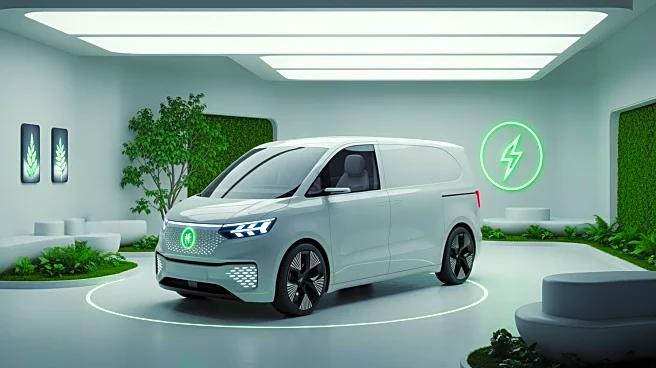What's Happening?
The Association of European Automobile Manufacturers (ACEA) has proposed a reduction in the CO2 targets for vans, suggesting a weaker target of 30-35% reduction by 2030, along with a 5-year averaging period
for 2025-2029 and 2030-2034. This proposal could significantly impact the growth of the zero-emission van market, potentially reducing the expected uptake of electric vans from 52% to 28% by 2030. Transport & Environment (T&E) has called on the European Commission to maintain the current -50% CO2 target for 2030 and limit averaging to 2025-2027. The proposal by ACEA could lead to increased CO2 emissions, air pollution, and overall costs, as electric vans are projected to become cheaper to own and operate than diesel vans by 2030.
Why It's Important?
The proposed weakening of CO2 targets by ACEA could hinder the transition to electric vans, affecting the automotive industry's efforts to reduce emissions and promote sustainability. If implemented, the proposal could result in fewer electric vans on the road, increasing reliance on diesel vehicles and contributing to higher emissions. This could also impact the competitiveness of European van manufacturers, as other regions may continue to advance in electric vehicle adoption. Maintaining stringent CO2 targets is crucial for driving innovation, reducing costs, and ensuring the availability of diverse electric van models.
What's Next?
The European Commission is expected to review ACEA's proposal and decide whether to uphold the current CO2 targets or consider the proposed changes. Policymakers may need to address regulatory barriers to van electrification, such as driving license requirements and tachograph regulations, to facilitate the transition. Additionally, fiscal policies and incentives could be tailored to support the adoption of electric vans, particularly for small fleets and private registrations. The development of charging infrastructure and zero-emission freight zones could further accelerate the uptake of electric vans in urban areas.
Beyond the Headlines
The debate over CO2 targets for vans highlights broader challenges in balancing industry interests with environmental goals. The proposal by ACEA reflects concerns about the feasibility of meeting stringent targets, but it also underscores the need for comprehensive policy action to support the transition to zero-emission vehicles. The outcome of this debate could influence future regulatory approaches to vehicle emissions and shape the trajectory of the automotive industry's sustainability efforts.









